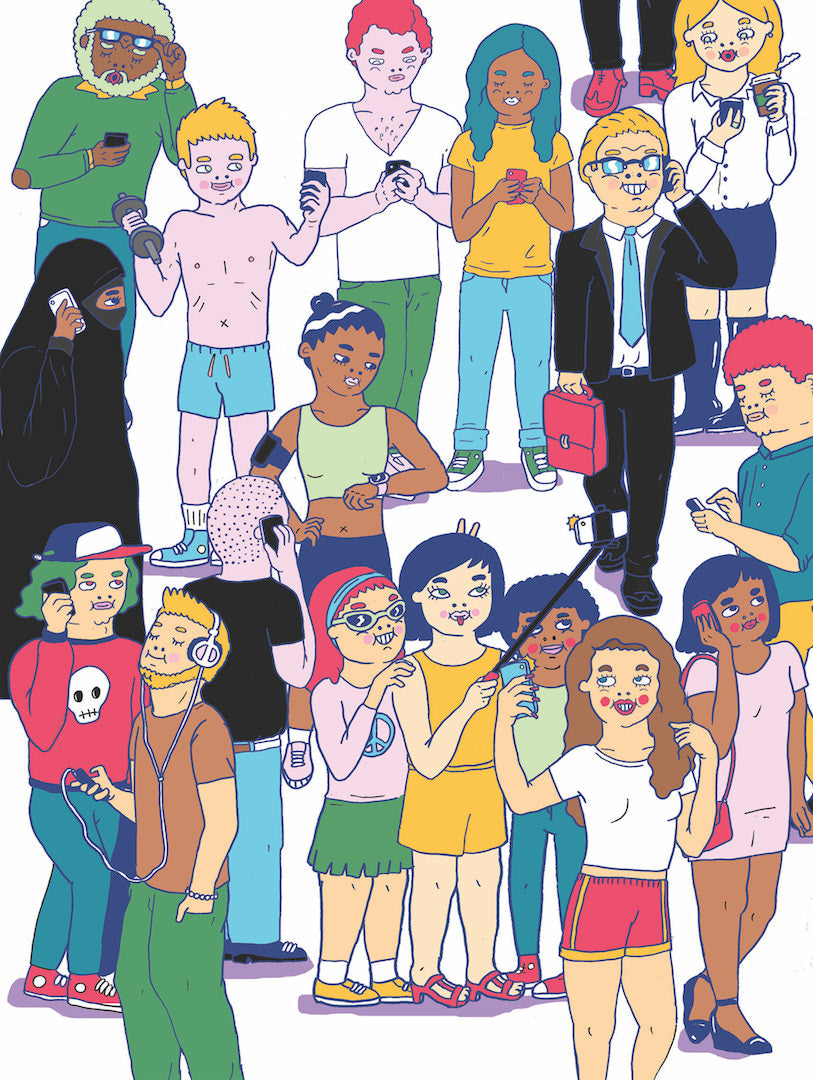We've relied so much on technology that it's hurting our health.
Welcome to the most distracted era in human history. Full disclaimer: I definitely checked my Instagram, Twitter, and email twice before completing this sentence.
Life is now digital. From our work to our social lives, we start and end the day on screens. Because technology is an integral part of our lives, its manifestation in popular culture has now become the norm. Take, for example, 2015 rap radio hit rapper Yo Gotti’s 2015 song “Down in the DM,” which refers to a certain (nasty) activity that happens in a direct message on social media. Once pop culture incorporates the slanguage and likeness of the Internet into music and other forms of mainstream art, culture has reached a tipping point. The New Yorker writer Malcolm Gladwell defines a tipping point as “that magic moment when an idea, trend, or social behavior crosses a threshold, tips, and spreads like wildfire.” Oftentimes, it can lead to an epidemic—and, right now, our digital health has reached epidemic proportions.
Living with a phone in your hand or a keyboard at your fingertips around the clock is the opposite of healthy. If you don’t believe me, notice your posture right now. How do your eyes feel? What about your head? Does it feel heavy as you’re leaning down to read this? Though the human head weighs 10 pounds, “when your neck is bent forward, the pressure felt on the cervical spine is about 50 pounds,” says Los Angeles-based chiropractor Dr. Nalbandyan Levon. Imagine this pressure on your neck muscles radiating into the shoulder blades, through your entire spine, and finally down to your feet.
Your eyes aren’t safe either. The way they interact with a screen sends physiological responses called screen apnea throughout the body causing a shortness of breath and shallow breathing, which can, in turn, lead to a variety of anxiety disorders. Notice how you breathe next time you’re staring at a digital light source for an extended period of time.
The mind-body connection has never been more important than in the digital era we’re embedded in. We put ourselves at risk of going down a digital k-hole every time we hop on social media. We’ve all done this before–we click on a profile or a picture and find ourselves an hour later emerging from a digital hole of creeping brands and people’s lives. Much like advertisements, the Internet affects our mind-state by plastering us with complex layers of images, words, and messages that we unknowingly internalize. We must acknowledge the crucial tipping point we’re in as it relates to our health in the digital age. Digital life has now become real life—the two are no longer mutually exclusive. When screens run our lives, our minds and bodies become innocent bystanders of technology.
How can we take care of our mental and physical health while we consume digitally? Creative entrepreneur Jarell Perry suggests replacing idle time with podcasts and educational material instead of a social feed. “If you’re going to consume something, be mindful that it’s going to lead you in the right direction,” he says. Because we live in the age of information where we see an up to 300 pieces of content per day, we have to proactively educate ourselves about digital health.
I sat down with a few other forward-thinking friends, including DJ Jasmine Solano and visual storyteller Sasha Marie, to discuss ways to balance our digital lives with our health. Here are three main lessons I learned from our conversations:
SET DIGITAL PARAMETERS
- Take stock of the time you spend digitally.
- Use your phone’s “Airplane Mode” often and disconnect for a bit.
- Value the time you spend with friends and family. Have real in-person conversations.
STAY EDUCATED
- Consume content responsibly not passively.
- Encourage dialogue about digital health through conversation, writing, or sharing of educational resources.
TAKE CARE OF YOURSELF
- Get sleep, stay hydrated, exercise, and take the time to talk and think about your feelings. Treat yourself.
- Create space and time to think about what made you happy when you were a kid.
Jacqueline Schneider is a writer, sociologist, and strategist focused on the intersection of music, technology, and culture. She is the Founder of Current Mood and former head of Global Strategy at Soulection.
Written by Jacqueline Schneider
Illustration by Marcela Szwarc





